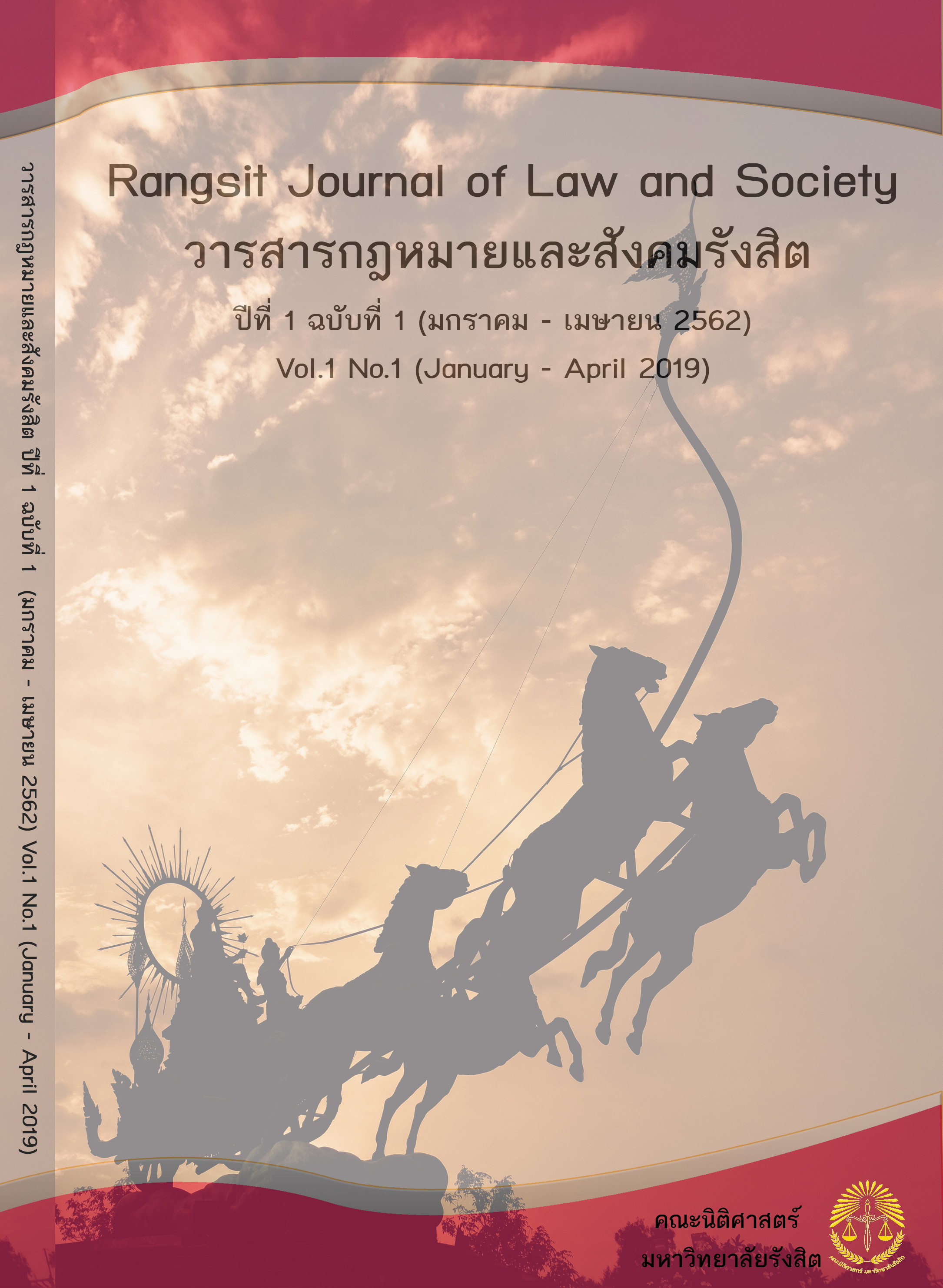การไกล่เกลี่ยข้อพิพาทระดับท้องถิ่นราชอาณาจักรไทย: เปรียบเทียบสาธารณรัฐฟิลิปปินส์
Main Article Content
บทคัดย่อ
กระบวนการไกล่เกลี่ยข้อพิพาทซึ่งเป็นกระบวนการยุติธรรมทางเลือก และเป็นส่วนหนึ่งที่จะช่วยเยียวยาหรือฟื้นฟู เพื่อให้ความเสียหายที่เกิดจากการกระทำผิด อาจจะเป็นทั้งทางแพ่งและอาญาได้รับการชดเชยให้กับผู้เสียหาย อีกทั้งเป็นการลดภาระค่าใช้จ่ายของคู่พิพาท ลดระยะเวลา ลดภาระงบประมาณของภาครัฐ ตลอดจนลดปริมาณคดีที่ไม่สำคัญและไม่จำเป็นที่จะขึ้นสู่การพิจารณาคดีของศาลลงได้เป็นจำนวนมาก ซึ่งนอกจากนี้ยังเป็นการเปิดโอกาสให้ผู้ที่ทำผิดได้แก้ไข และยังให้โอกาสประชาชนได้มีส่วนร่วมในการเสริมสร้างความยุติธรรมโดยไม่ต้องต่อสู้กันในการพิจารณาคดี และผลที่ออกมาจะไม่มีแพ้ หรือชนะ มีแต่ชนะด้วยกันทั้งสองฝ่ายโดยสันติวิธี เพราะเป็นวิธีการที่เป็นมิตรมีรูปแบบปรองดองสมานฉันท์ระหว่างกันซึ่งเป็นกระบวนการระงับข้อพิพาททางเลือกที่ดีและแพร่หลายในต่างประเทศและเป็นการสร้างสันติวัฒนธรรมในสังคมได้
จากการศึกษาการไกล่เกลี่ยข้อพิพาทระดับท้องถิ่นทั้งของราชอาณาจักรไทยและสาธารณรัฐฟิลิปปินส์ เห็นว่าทั้งสองประเทศมีเจตนารมณ์ที่มุ่งให้คู่กรณีระงับข้อพิพาทด้วยการไกล่เกลี่ยข้อพิพาทระดับท้องถิ่นเหมือนกัน ตลอดจนให้มีวัตถุประสงค์ที่สำคัญคือการให้เกิดความสมานฉันท์ในท้องถิ่นมากที่สุด ดังนั้นกระบวนการไกล่เกลี่ยข้อพิพาทระดับท้องถิ่นของทั้งสองประเทศ จึงถือเสมือนว่าเป็นส่วนสำคัญที่ทำให้ยุติข้อพิพาทลงได้ด้วยกระบวนการไกล่เกลี่ยข้อพิพาทระดับท้องถิ่นเพื่อประโยชน์ของทั้งสองประเทศอย่างดียิ่ง การทำให้ท้องถิ่นมีบทบาทในการจัดการความขัดแย้งได้เอง สามารถสร้างสังคมสันติสุขได้อย่างยั่งยืนและลดภาระของกระบวนการยุติธรรมภาครัฐลงได้มาก
Article Details

อนุญาตภายใต้เงื่อนไข Creative Commons Attribution-NonCommercial-NoDerivatives 4.0 International License.
เอกสารอ้างอิง
จรัญ โฆษณานันท์. (2558). นิติปรัชญา. (พิมพ์ครั้งที่ 19). กรุงเทพมหานคร: มหาวิทยาลัยรามคำแหง.
ถวิลวดี บุรีกุล และคณะ. (2562). ระบบยุติธรรมชุมชนในประเทศประชาคมอาเซียน : กรณีศึกษาสาธารณรัฐฟิลิปปินส์. กรุงเทพมหานคร: ศูนย์การพิมพ์แก่นจันทร์.
ประเสริฐ สะหว่างดี. (2552). กระบวนการไกล่เกลี่ยระงับข้อพิพาททางอาญา : ศึกษาเปรียบเทียบกรณีการไกล่เกลี่ยข้อขัดแย้งขั้นบ้านของ สปป.ลาว กับการประนอมข้อพิพาททางอาญาในระดับหมู่บ้านของประเทศไทย. ใน วิทยานิพนธ์ปริญญานิติศาสตรมหาบัณฑิต. กรุงเทพมหานคร: สาขานิติศาสตร์ จุฬาลงกรณ์มหาวิทยาลัย.
พรรณยง พุฒิกาษ. (2555). กระบวนการระงับข้อพิพาททางเลือก. ใน สรวิศ ลิมปรังษี, การจัดการความขัดแย้งกับการไกล่เกลี่ยข้อพิพาท ความรู้เบื้องต้นเกี่ยวกับการไกล่เกลี่ยข้อพิพาท (หน้า 49-58). กรุงเทพมหานคร: ธนาเพรส.
ศูนย์วิเทศอาเซี่ยน กองการต่างประเทศ สำนักงานศาลยุติธรรม. (2562). ศูนย์วิเทศอาเซียน. เข้าถึงได้จาก ศาลยุติธรรม Court of Justice: https://acc.coj.go.th/th/content/category/articles/id/8/cid/9251
สมยศ เชื้อไทย. (2551). ความรู้กฎหมายทั่วไป. ใน คำอธิบายกฎหมายแพ่ง : หลักทั่วไป (หน้า 7-12). (พิมพ์ครั้งที่ 15).กรุงเทพมหานคร: วิญญูชน.
สรวิศ ลิมปรังษี. (2555). ความขัดแย้งและวิธีการระงับข้อพิพาททางเลือก. ใน การจัดการความขัดแย้งกับการไกล่เกลี่ยข้อพิพาท ความรู้เบื้องต้นเกี่ยวกับการไกล่เกลี่ยข้อพิพาท (หน้า 25-48). กรุงเทพมหานคร: ธนาเพรส.
สัณฐิติ ธรรมใจ. (2553). การไกล่เกลี่ยคดีอาญา: ศึกษาเฉพาะการยุติคดีอาญาโดยนายอำเภอ. ใน วิทยานิพนธ์ ปริญญานิติศาสตรมหาบัณฑิต สาขานิติศาสตร์. กรุงเทพมหานคร: มหาวิทยาลัยธุรกิจบัณฑิตย์.
สุพิศ ประณีตพลกรัง. (2562). การไกล่เกลี่ยข้อพิพาทตามกฎหมายใหม่ : พระราชบัญญัติการไกล่เกลี่ยข้อพิพาท พ.ศ.2562. กรุงเทพมหานคร: สำนักพิมพ์นิติธรรม.
หยุด แสงอุทัย. (2510). ความรู้เบื้องต้นเกี่ยวกับกฎหมายทั่วไป. กรุงเทพมหานคร: โรงพิมพ์มหาวิทยาลัยธรรมศาสตร์.
Christopher W. Moore. (1996). The Mediation Process, Practical. Strategies for Resolving Conflict. USA: Jossey-Bass.
Michael L. Moffitt and Robert C. Bordone. (2005). The Handbook of Dispute Resolution. California USA: Jossey-Bass.

